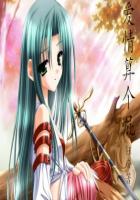THE GREEK THEATRE THE ORIGINS OF THE THEATRE, THE FIRST FORM OF PUBLIC AMUSEMENT
AT a very early stage of their history the Greeks had begun to collect the poems, which had been written in honor of their brave ancestors who had driven the Pelasgians out of Hellas and had destroyed the power of Troy. These poems were recited in public and everybody came to listen to them. But the theatre, the form of entertainment which has become almost a necessary part of our own lives, did not grow out of these recited heroic tales. It had such a curious origin that I must tell you something about it in a separate chapter The Greeks had always been fond of parades. Every year they held solemn processions in honor of Dionysos the God of the wine. As everybody in Greece drank wine (the Greeks thought water only useful for the purpose of swimming and sailing) this particular Divinity was as popular as a God of the Soda-Fountain would be in our own land.
And because the Wine-God was supposed to live in the vineyards, amidst a merry mob of Satyrs (strange creatures who were half man and half goat), the crowd that joined the procession used to wear goat-skins and to hee-haw like real billy-goats. The Greek word for goat is "tragos" and the Greek word for singer is "oidos." The singer who meh-mehed like a goat therefore was called a "tragos-oidos" or goat singer, and it is this strange name which developed into the modern word "Tragedy," which means in the theatrical sense a piece with an unhappy ending, just as Comedy (which really means the singing of something "comos" or gay) is the name given to a play which ends happily.
But how, you will ask, did this noisy chorus of masqueraders, stamping around like wild goats, ever develop into the noble tragedies which have filled the theatres of the world for almost two thousand years?
The connecting link between the goat-singer and Hamlet is really very simple as I shall show you in a moment.
The singing chorus was very amusing in the beginning and attracted large crowds of spectators who stood along the side of the road and laughed. But soon this business of tree-hawing grew tiresome and the Greeks thought dullness an evil only comparable to ugliness or sickness. They asked for something more entertaining. Then an inventive young poet from the village of Icaria in Attica hit upon a new idea which proved a tremendous success. He made one of the members of the goat-chorus step forward and engage in conversation with the leader of the musicians who marched at the head of the parade playing upon their pipes of Pan. This individual was allowed to step out of line. He waved his arms and gesticulated while he spoke (that is to say he "acted" while the others merely stood by and sang) and he asked a lot of questions, which the bandmaster answered according to the roll of papyrus upon which the poet had written down these answers before the show began.
This rough and ready conversation--the dialogue--which told the story of Dionysos or one of the other Gods, became at once popular with the crowd. Henceforth every Dionysian procession had an "acted scene" and very soon the "acting" was considered more important than the procession and the meh-mehing.
AEschylus, the most successful of all "tragedians" who wrote no less than eighty plays during his long life (from 526 to 455) made a bold step forward when he introduced two "actors" instead of one. A generation later Sophocles increased the number of actors to three. When Euripides began to write his terrible tragedies in the middle of the fifth century, B.C., he was allowed as many actors as he liked and when Aristophanes wrote those famous comedies in which he poked fun at everybody and everything, including the Gods of Mount Olympus, the chorus had been reduced to the role of mere bystanders who were lined up behind the principal performers and who sang "this is a terrible world" while the hero in the foreground committed a crime against the will of the Gods.
This new form of dramatic entertainment demanded a proper setting, and soon every Greek city owned a theatre, cut out of the rock of a nearby hill. The spectators sat upon wooden benches and faced a wide circle (our present orchestra where you pay three dollars and thirty cents for a seat).
Upon this half-circle, which was the stage, the actors and the chorus took their stand. Behind them there was a tent where they made up with large clay masks which hid their faces and which showed the spectators whether the actors were supposed to be happy and smiling or unhappy and weeping. The Greek word for tent is "skene" and that is the reason why we talk of the "scenery" of the stage.
When once the tragedy had become part of Greek life, the people took it very seriously and never went to the theatre to give their minds a vacation. A new play became as important an event as an election and a successful playwright was received with greater honors than those bestowed upon a general who had just returned from a famous victory.














